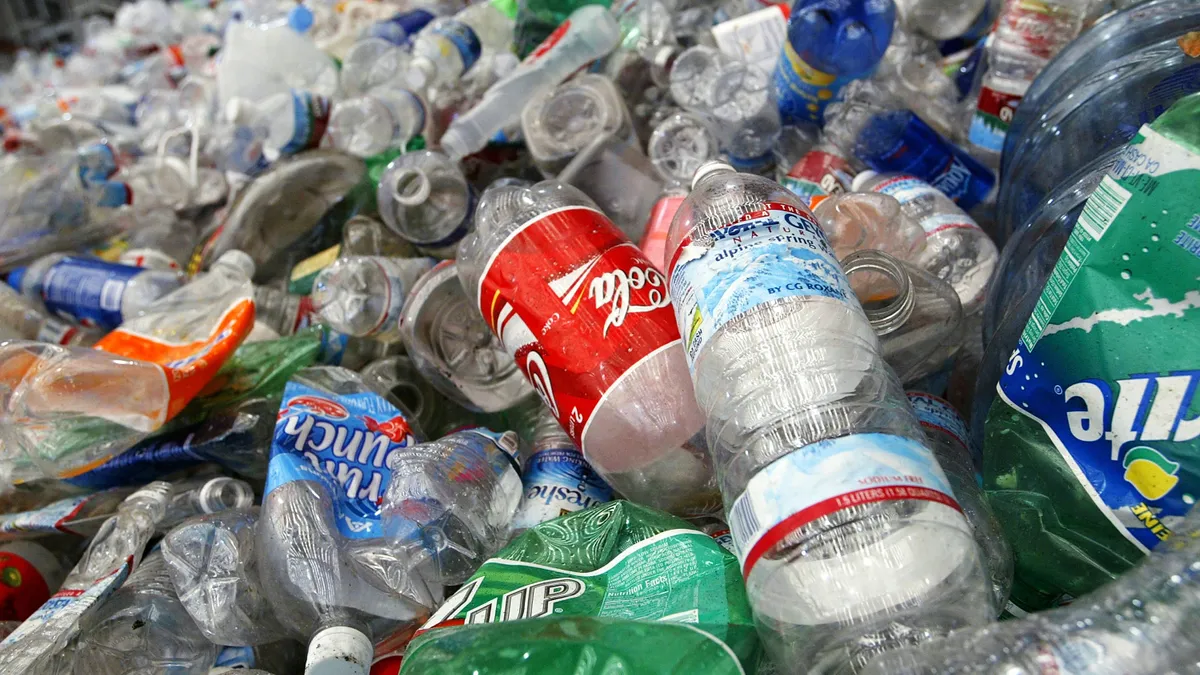Dive Brief:
- A group of the world's largest corporate foundations and consumer brands are extending their investment of more than $54 million into the Closed Loop Infrastructure Fund (CLIF) for another five years. The investment aims to bolster recycling infrastructure, along with technological innovation around North American end markets for post-consumer recycled material, according to Closed Loop Partners (CLP).
- The companies extending their investment are the nine original CLIF investors: 3M, Coca-Cola, Colgate Palmolive, Johnson & Johnson Consumer Health, Keurig Dr. Pepper, PepsiCo, Procter & Gamble, Unilever, and The Walmart Foundation. Several other companies have also joined the fund since that original investment, including Amazon, Danone North America, Danone Waters of America, Nestlé Waters North America, and Starbucks.
- CLP Managing Director Bridget Croke told Waste Dive the announcement's timing, which comes in the midst of the coronavirus pandemic, indicates companies are "still committed" to achieving their recycling goals. Experts see those aims as contingent on improving infrastructure and addressing other supply chain issues, which requires funding. "They know they need to be aggressive to solve the bottleneck that would hold them back from reaching their goals," said Croke.
Dive Insight:
Responding to public opinion on environmental issues and climate change has significantly shifted corporate commitments around recycling and plastics reduction in recent years. The CLIF extended investment indicates the pandemic has not slowed that momentum.
The initial investment made by the original nine foundations and brands has gone toward upgrading several facilities around the country. According to a 2019 impact report, CLIF has funneled $58 million into 27 projects, while spurring $220 million in co-investment. Beneficiaries include Minnesota-based Eureka Recycling, a nonprofit with its own MRF, along with Emerald Coast Utilities Authority in Florida, another MRF operator.
TemperPack in Virginia, a company that manufactures proprietary plant and fiber-based insulated packaging meant to to replace polystyrene, has also received funding. The products are certified recyclable, but recyclers often single out polystyrene due to the challenges associated with recycling it.
A key component of CLP's model is taking on higher-risk investments, which in turn reduces the risk for other investors. "We like to be a portion of the capital coming into a project," said Croke.
Bruce Karas, vice president of safety and sustainability at Coca-Cola North America, told Waste Dive the company's investment supports goals of collecting and recycling "the equivalent" of every bottle or can sold globally by 2030.
"We know we can’t reach this goal without significant partners like the Closed Loop Fund who are helping to address the gaps in the domestic recycling system," he said, adding the company chose to reinvest in CLIF "to support their meaningful progress to optimize and upgrade recycling infrastructure."
PepsiCo Beverages North America Communications Director Katie Clark similarly pointed to the company's stake in improving recycling systems. "We are committed to building a circular future for packaging and know that impact at scale requires partnerships like this," Clark told Waste Dive via email.
For the new investment round, CLP's approach remains one of investing across the recycling sector and in different areas identified as high priority. "Our strategy is kind of an evolving target based on the market realities that we're in at any given time," Croke said, naming collection, robotics and MRF upgrades as some major focuses. Those all pose a "large bottleneck opportunity," she said, which currently hinders broader recycling efforts.
At the MRF level, another focus is capturing more fiber – which has risen to new levels of prominence during the pandemic – along with certain types of plastic. Reducing contamination and improving the quality of those bales is a particular priority for the sector, Croke said.
"Our orientation we have right now is to rally around creating high value commodities that can go back into the chain," she said.
That approach extends to some activity on Capitol Hill. Croke recently testified during a Senate hearing on recycling and advocated for mechanisms like tax incentives to spur market demand. CLP is not proactively taking a stance on any one piece of legislation, but is offering feedback to lawmakers, Croke told Waste Dive.
It is unclear whether other companies might join those currently attached to CLIF, but Croke said the door is open for that possibility. She also pointed to separate efforts like the Every Bottle Back initiative announced last fall. CLP serves as a partner in that initiative, which seeks to improve the quality and availability of recycled plastics in several U.S. regions. Croke cited that effort, spearheaded by the American Beverage Association, as an example of potential partnerships to come.
"I anticipate there may be more industry groups that say, 'oh, this makes sense for our industry,'" she said.










